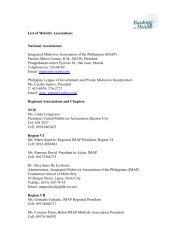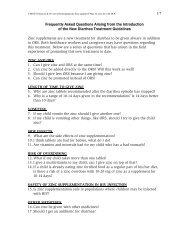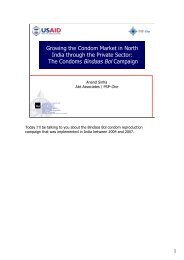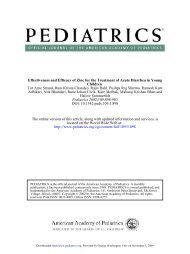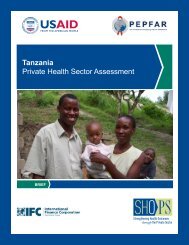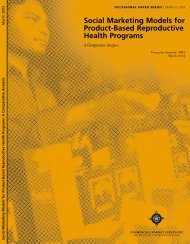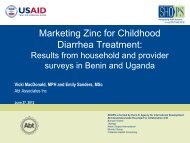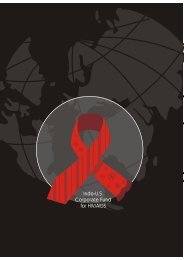Nigeria Private Sector Health Assessment - SHOPS project
Nigeria Private Sector Health Assessment - SHOPS project
Nigeria Private Sector Health Assessment - SHOPS project
You also want an ePaper? Increase the reach of your titles
YUMPU automatically turns print PDFs into web optimized ePapers that Google loves.
5.5 <strong>Private</strong>-<strong>Sector</strong> Product Supply<br />
One simple measure of the security of contraceptive supplies is the number and diversity of entities<br />
manufacturing them in or importing them into a country. By this measure <strong>Nigeria</strong> is doing well with a<br />
variety of governmental (national), donor (USAID, the United Nations Population Fund (UNFPA), and<br />
the U.K. Department for International Development (DFID)), NGOs (SFH, IPPF, and CHANPHARM),<br />
and commercial entities bringing contraceptives into the country. On other measures, however, <strong>Nigeria</strong><br />
is not doing as well. DELIVER’s contraceptive-security index considers distribution systems, information<br />
systems, forecasting, policy, gross national product per capita, poverty level, and other demand and use<br />
criteria. On this aggregate score, <strong>Nigeria</strong> is the 9 th worst country of the 57 that were assessed. While<br />
this index has a bias toward public-sector systems, the policy and demand criteria are relevant for the<br />
private sector and <strong>Nigeria</strong> scores poorly in those areas as well.<br />
Most donor investments to increase and improve reproductive health supplies have focused on the<br />
public sector. Besides product procurement and donations (especially from USAID, UNFPA, and DFID),<br />
effort and investment has gone into strengthening the logistics and management systems of governments<br />
at all levels. In this respect the decentralization of the federal system has complicated efforts to make<br />
products available on a sustainable basis in the private sector. Simple logistics systems tend to be the<br />
most sustainable, but the federal system in <strong>Nigeria</strong> necessitates working through the national, state, and<br />
local government area (LGA) governments, even when it would be more efficient not to. After the fall<br />
of the Abacha regime, USAID funded the DELIVER <strong>project</strong> to support the government’s contraceptive<br />
logistics system, which had suffered from neglect since the departure of USAID from <strong>Nigeria</strong> in the early<br />
1990s. A midterm evaluation of the DELIVER <strong>project</strong> showed significant progress from 2002 baseline in<br />
systems and overall availability, but many problems remain in terms of stockouts. During the six months<br />
prior to the survey, 14 to 33 percent of service-delivery points experienced prolonged stockouts of<br />
injectables or pills (DELIVER Midterm evaluation).<br />
In some markets gaps in the public-sector supply system create opportunities for the private sector<br />
to provide contraceptives. With the exception of the social-marketing program, however, commercial<br />
supply sources have not achieved significant market shares. The largest player in the commercial market<br />
is Schering, which sells Microgynon through commercial channels and supplies Noristerat through SFH.<br />
The social-marketing products dominate their respective markets. According to SFH its condoms have<br />
a 73.8 percent share of the total market, its oral contraceptive have a 79.5 percent share of the total<br />
market, and the SFH injectable has a 61.3 percent share of the total market (the total market means<br />
all commercial and public sales and distribution) (Population Services International 2005 Annual Sales<br />
Report 2005). These statistics beg the question: With a population of more than 130 million people and<br />
a growing economy, why haven’t more commercial manufacturers invested in increasing the <strong>Nigeria</strong>n<br />
contraceptive market<br />
The current government’s reforms are making <strong>Nigeria</strong> more business friendly, but change takes time to<br />
be felt, and for the moment <strong>Nigeria</strong> remains a risky place to conduct business. Unless companies feel<br />
their prospects are good for generating a higher-than-average return in a shorter-than-average payoff<br />
period, they will not invest. The contraceptive market in <strong>Nigeria</strong> has not reached a maturity that satisfies<br />
those criteria. As noted previously demand is low and distribution costs are high. Although supplies<br />
in the public sector are generally inadequate for meeting demand, they are unpredictable and there is<br />
frequent leakage from the public sector to the commercial one. Fear of competing with a dominant<br />
18



